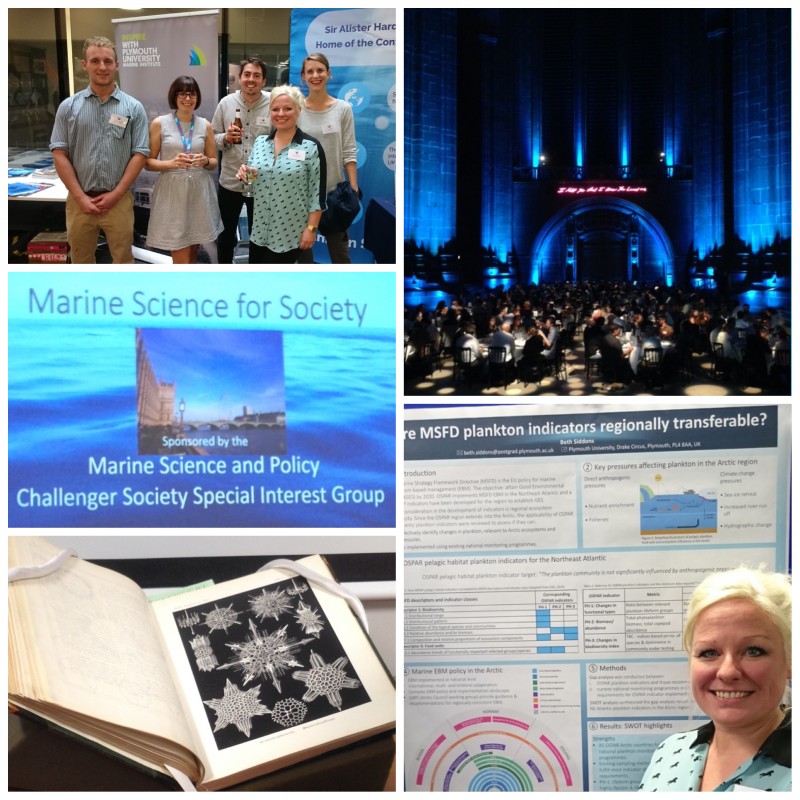Biennial Challenger Conference: Liverpool
Beth Siddons
Plymouth University

Photo caption: (clockwise from top left) Plymouth University’s Plankton and Policy Group; conference dinner at the Liverpool Anglican Cathedral; the poster presentation; viewing of original Ernst Haekel lithographs; Marine Science and Society presentation session.
Blog:
I was very fortunate to receive a Challenger Society Travel Award, which enabled me to attend the Challenger Society’s Biennial Conference in Liverpool, in September 2016. As an MSc student, the conference was a fantastic first foray into the scientific community. Not only was it my first conference, but also my first poster presentation. It was a great opportunity to present my MSc dissertation research, ‘are MSFD plankton indicators regionally transferable?’, and get feedback from peers and established marine scientists. The Challenger Society is really encouraging of early career scientists and the conference created a very supportive environment, so it was a perfect place to start.
The conference kicked off with an Early Career Event, which featured a panel of established marine science professionals from a variety of backgrounds, ranging from commercial sales or technological development to academia or policy and advocacy. After a short introduction from each, there was a breakout session that gave early career scientists the opportunity to pose questions and get advice on areas of interest. The session exemplified Challenger Society’s supportive approach to developing the next generation of marine scientists. In addition, I took advantage of the event’s mentor programme, which paired me with a scientist at CEFAS. It was a brilliant chance to pick the brain of an established marine scientist and get feedback on my research.
The week was intensive, with fantastic presentations on a vast range of subjects and networking with people from a diversity of marine science disciplines. The sheer variety of subject matters, with 2 to 3 lectures taking place at any one time, meant that there was always a presentation topic of interest. There was plenty of time for socialising too - the conference dinner at Liverpool's Anglican Cathedral was a particularly great evening, with some fantastic speakers and another great chance to meet new people and relax over dinner.
An unexpected highlight was the opportunity to view original Ernst Haekel lithographs which were part of the Liverpool University Library’s Special Collection. As a self-confessed plankton geek it was a real treat and Prof. Peter Williams gave a fascinating insight into the man himself, as well as how the lithographs were been created. It’s a great example of how the Challenger Society Conference went above and beyond the content of its presentation programme.
The conference was an invaluable experience for me as I approached the end of my postgraduate study and I would to extend my thanks to the Challenger Society for the Travel Award that made my attendance possible.
Profile:
I am a student on the MSc in Applied Marine Science at Plymouth University. My research focus is the application of plankton indicators in the establishment of good environmental status, specifically reviewing the applicability of MSFD indicators in the OSPAR Arctic region.
Latest News
Royal Society Publishing Photography Competition 2025
Please see a message from the Royal Society below:
We are delighted to announce that the 2025 Competition is now open for entries until 15 August for a chance to win £1000! The competition celebrates the power of photography in conveying the wonder of science happening all around us and photographs can be submitted in the categories of: Astronomy, Behaviour, Earth Science and Climatology, Ecology and Environmental Science, and Microimaging.
The competition is free to enter and open to anyone studying or working in science at graduate level or above. Category winners will receive a one-year membership to the Royal Photographic Society and the overall winner will receive a grand prize of £1,000. Find out more: https://bit.ly/RSPphotocomp
October 2025 MEDIN Workshop: Marine Data Management, Governance and the MEDIN toolset
The Marine Environmental Data and Information Network (MEDIN) are pleased to announce that registration is now open for the next occurrence of our popular free online training workshop: ‘Marine Data Management, Governance and the MEDIN toolset’ on the 13th – 17th October 2025 on OceanTeacher Global Academy.
Marine Data Management, Governance and the MEDIN toolset
The Marine Environmental Data and Information Network (MEDIN) and OceanWise are delighted to invite you to attend our popular free online training workshop: ‘Marine Data Management, Governance and the MEDIN toolset’ on the 19th – 23rd of May 2025.
